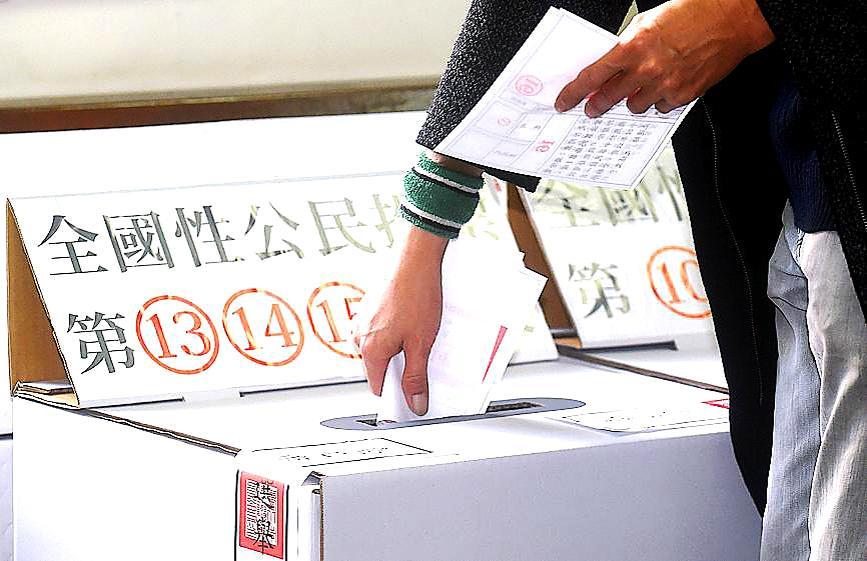Academics today expressed concern that combining referendums with elections would result in more risks than benefits, as experts and officials gathered to discuss proposed changes to referendum law.
Chinese Nationalist Party (KMT) Legislator Lo Chih-chiang’s (羅智強) draft amendment would require that referendums be held between one and six months of being announced, and held on the same day as a national election if the dates coincide.
The Legislative Yuan’s Internal Administration Committee decided that there would be two public hearings to debate the amendments, the second of which was today, led by KMT Legislator Hsu Hsin-ying (徐欣瑩).

Photo: Liao Chen-huei, Taipei Times
In the hearing, experts said that referendums are often more about politics than genuine public desire.
However, the proposal could be feasible if the referendum’s deliberation and announcement periods are stretched out to longer than six months, they said.
Voting can be a bigger burden when asking citizens to vote on both issues and candidates simultaneously, which could lead to less rational decisionmaking, said Wang Yi-fan (王禕梵), a professor of political science at National Cheng Kung University.
The decision to combine referendums with elections is one of choice, rather than binary right and wrong, National Chengchi University law professor Lin Chia-ho (林佳和) said.
A successful referendum system is one that has sufficient time for full deliberation and ensures that all voters are aware of the issues they are voting on, Lin added.
Referendums are often political tools rather than reflections of public will, and under current conditions, the proposal would do more harm than good, he said.
If the deliberation period is extended longer than six months, it would help focus the public and make the proposal viable, he added.
Under the Referendum Act (公民投票法), officials review proposals within 60 days of receipt and announce referendum dates at last 90 days in advance.
Current regulations limit referendums to once every two years, but under the new proposal, they could happen twice in 12 months, which could overburden the public or increase voter fatigue, said Chen Chi-hua (陳志華), a professor of politics at National Taipei University.
The chaos during the 2018 local elections, which were combined with referendums, was due to technical issues, not systemic flaws, Kainan University law professor Chang Kuei-mei (仉桂美) said.
Chang, who at the time was a member of the Control Yuan and criticized the Central Election Committee (CEC), said that the Democratic Progressive Party failed to address the administrative and technological issues, which has deprived voters of their rights.
Rational deliberation is essential for referendums, CEC Deputy Chairman Chen Chao-chien (陳朝建) said.
Separating referendums and elections gives officials enough time to prepare, and helps voters focus on issues separately from candidates, which contributes to democratic consolidation and stability, Chen said.
Regarding suggestions around electronic voting, Chen said that Taiwan’s enemies would want the nation to implement it as a way of undermining democracy, adding that society’s trust is a priority.

‘DENIAL DEFENSE’: The US would increase its military presence with uncrewed ships, and submarines, while boosting defense in the Indo-Pacific, a Pete Hegseth memo said The US is reorienting its military strategy to focus primarily on deterring a potential Chinese invasion of Taiwan, a memo signed by US Secretary of Defense Pete Hegseth showed. The memo also called on Taiwan to increase its defense spending. The document, known as the “Interim National Defense Strategic Guidance,” was distributed this month and detailed the national defense plans of US President Donald Trump’s administration, an article in the Washington Post said on Saturday. It outlines how the US can prepare for a potential war with China and defend itself from threats in the “near abroad,” including Greenland and the Panama

The Chinese Nationalist Party (KMT) is maintaining close ties with Beijing, the Democratic Progressive Party (DPP) said yesterday, hours after a new round of Chinese military drills in the Taiwan Strait began. Political parties in a democracy have a responsibility to be loyal to the nation and defend its sovereignty, DPP spokesman Justin Wu (吳崢) told a news conference in Taipei. His comments came hours after Beijing announced via Chinese state media that the Chinese People’s Liberation Army’s Eastern Theater Command was holding large-scale drills simulating a multi-pronged attack on Taiwan. Contrary to the KMT’s claims that it is staunchly anti-communist, KMT Deputy

RESPONSE: The government would investigate incidents of Taiwanese entertainers in China promoting CCP propaganda online in contravention of the law, the source said Taiwanese entertainers living in China who are found to have contravened cross-strait regulations or collaborated with the Chinese Communist Party (CCP) could be subject to fines, a source said on Sunday. Several Taiwanese entertainers have posted on the social media platform Sina Weibo saying that Taiwan “must be returned” to China, and sharing news articles from Chinese state media. In response, the Mainland Affairs Council (MAC) has asked the Ministry of Culture to investigate whether the entertainers had contravened any laws, and asked for them to be questioned upon their return to Taiwan, an official familiar with the matter said. To curb repeated

Myanmar has turned down an offer of assistance from Taiwanese search-and-rescue teams after a magnitude 7.7 earthquake struck the nation on Friday last week, saying other international aid is sufficient, the National Fire Agency said yesterday. More than 1,700 have been killed and 3,400 injured in the quake that struck near the central Myanmar city of Mandalay early on Friday afternoon, followed minutes later by a magnitude 6.7 aftershock. Worldwide, 13 international search-and-rescue teams have been deployed, with another 13 teams mobilizing, the agency said. Taiwan’s search-and-rescue teams were on standby, but have since been told to stand down, as